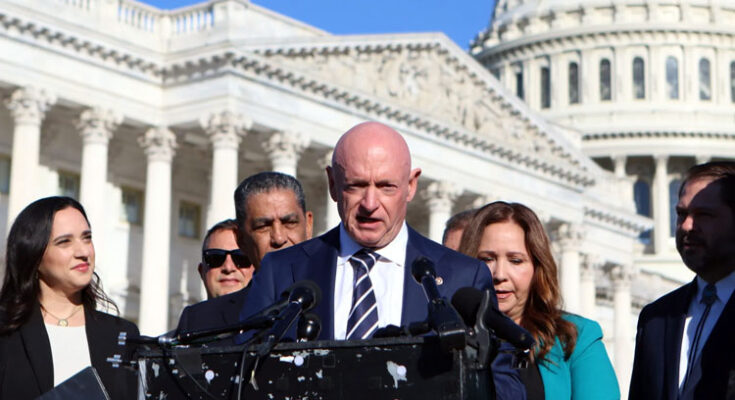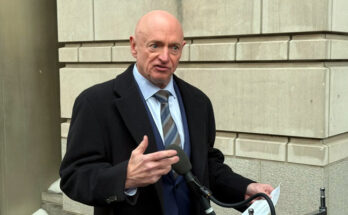By Tufan Neupane/Cronkite News
WASHINGTON – At a forum on political violence on the campus where Charlie Kirk was killed, Sen. Mark Kelly blamed President Donald Trump on Wednesday for deepening political divisions rather than tamping down the anger.
He “uses every opportunity he can to drive a wedge between Americans,” even at a moment of high partisanship like Kirk’s murder, said the Arizona Democrat, whose wife was shot in 2011 while meeting with constituents.
Kelly delivered the remarks at Utah Valley University, in a conversation with Sen. John Curtis, a Utah Republican, moderated by CNN’s Dana Bash.
Kirk, a high-profile conservative activist, was shot dead there two months ago.
Kelly cited Trump’s remarks at the memorial service as a missed opportunity for the president to help calm the nation. After Kirk’s wife, Erika, said she forgave the killer, the president distanced himself from that sentiment, saying he “hates his political opponents.”
“Not healthy for our democracy,” Kelly said. “He’s the president of the United States. People listen to him. They act on his words more than anybody else in our country. Donald Trump’s words matter.”
Kelly added that he would love to wake up one day to a “kumbaya” tweet from Trump that brings people together, “but it’s just never there.”
Both senators said social media is fueling anger, misinformation, and isolation. Both said they support efforts in Congress to hold platforms accountable for algorithms that push harmful content.
“If your product, which is the algorithm, creates a situation that is harmful to the user, just like any other product that’s created, you bear liability for that,” Curtis said.
Kelly agreed, saying companies should face consequences “if there’s a bad outcome because they applied an algorithm.”
The conversation came as the United States faces a surge in politically motivated attacks.
Data from the Armed Conflict Location & Event Data Project show 54 people were killed in political violence between December 2024 and October 2025 in this country.
In June, a gunman targeting Democratic lawmakers shot and killed the former speaker of the Minnesota House of Representatives, Melissa Hortman, and her husband in their home. A state senator and his wife were wounded in a separate shooting nearby.
In April, a man broke into the Pennsylvania governor’s mansion and set a fire. He later admitted he planned to attack Gov. Josh Shapiro, also a Democrat, with a hammer.
In Washington, two staff members at the Israeli embassy were fatally shot.
Recent years have seen other high-profile attacks, including the 2022 hammer attack on Paul Pelosi, husband of former U.S. House Speaker Nancy Pelosi, a Democrat.
Also in 2022, authorities arrested an armed man who intended to kill conservative Supreme Court Justice Brett Kavanaugh.
A CBS News poll in October found that 86% of Americans believe political violence is unacceptable, but 68% expect it to rise.
Kelly said Kirk’s killing brought back memories of the 2011 Tucson shooting that nearly cost the life of his wife, Gabby Giffords, then a member of the U.S. House.
He said he respected Kirk’s willingness to speak with students, even though they were in “different universes politically.”
“I did not agree with him on much,” Kelly said. “But I’ll tell you what, I will go to war to fight for his right to say what he believes.”
Kelly cited a number of factors driving political violence, including isolation, anger, and online influences that can push vulnerable young men toward dangerous behavior.
“We’ve got a big problem with young men who don’t have jobs, don’t have a lot of friends, don’t have a social network,” he said. “We’ve got to engage with them more and meet them, starting out where they are.”
The Arizona Democrat also called for stronger gun laws, including background checks and temporary limits for people in crisis.
“You have got to get a background check in most places if you’re going to adopt a dog,” Kelly said. “I think part of the responsibility is to make sure that responsible people are owning firearms.”
Curtis said he opposed such measures. Instead, he called for “nuanced” policies that add due-process protections and give police better tools to deal with potentially violent gun owners.
For more stories from Cronkite News, visit cronkitenews.azpbs.org.










